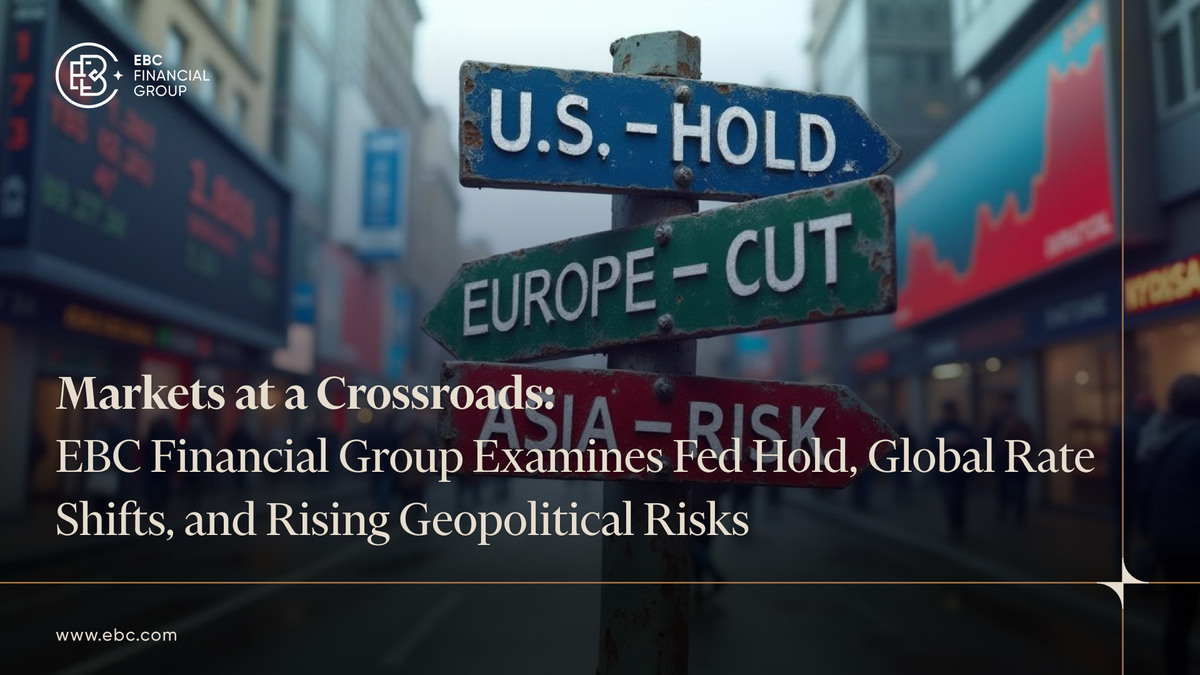In a world where central banks once moved in lockstep, traders are now facing
a dramatically more fractured monetary landscape. On May 7, the U.S. Federal
Reserve chose to hold interest rates steady at 4.25% and 4.50%, even as
inflationary concerns remain and trade policy tensions escalate. Meanwhile, the
European Central Bank cut rates in April, and markets are widely anticipating
the Bank of England may follow suit as early as today.
Amid these developments, we at EBC Financial Group (EBC), a globally
regulated brokerage, are highlighting how this growing monetary policy
divergence—combined with renewed geopolitical risks such as rising
India–Pakistan tensions—is reshaping trader strategies and creating a demand for
insight-driven navigation through volatile markets.
"This is the most significant divergence in major central bank policy we've
seen since the pandemic recovery period," noted David Barrett, CEO of EBC
Financial Group (UK) Ltd. "The Fed is holding firm, while the European Central
Bank has already begun easing—and the Bank of England may follow. For traders,
it's no longer just about the direction of rates, but why the paths are
splitting and what that means for global positioning."

The Fed Hits Pause—But Uncertainty Pushes Play
While the Fed held rates steady, citing a great deal of uncertainty
surrounding inflation and the economic effects of new tariffs introduced by
President Donald Trump, the European Central Bank broke from its tightening
stance last month, lowering its deposit rate by 25 basis points to 2.25%—marking
its first rate cut since the pandemic-era normalisation began. This divergence
highlights a growing split in how major economies are responding to inflation
dynamics, trade-related pressures, and weakening growth indicators.
Fed Chair Jerome Powell's emphasis on caution—driven in part by uncertainty
over the inflationary impact of renewed U.S. tariffs—contrasts with the European
Central Bank's recent pivot toward growth support, as it cut rates to counter
flagging momentum across the Eurozone.
Geopolitical Tensions Amplify Market Volatility
Further compounding uncertainty are heightened geopolitical tensions,
particularly in Asia, where escalating conflict rhetoric between India and
Pakistan has stoked concern over regional market instability, energy price
volatility, and safe-haven flows.
"Geopolitical threats are re-emerging as a top-tier market risk," commented
Barrett. "In the past, events like this may have been isolated, but in today's
interconnected financial system, conflict—even perceived—can quickly ripple
through currencies, commodities, and investor sentiment globally."
Gold and oil markets have already reflected these shifts. In the commodities
market, gold prices have surged, reaching $3,397 per ounce, as investors seek
safe-haven assets amid the escalating conflict and broader economic
uncertainties. This uptick reflects a broader trend where geopolitical tensions
drive investors toward assets perceived as more stable during periods of
uncertainty.
Across asset classes, traders are adjusting not only to data but to the
absence of clear global consensus. With some central banks signalling easing,
others holding steady, and yet others still under inflationary pressure, the
challenge lies in navigating a world where the usual indicators no longer apply
universally.
"This is not a moment for passive observation," added Barrett. "It's a time
when traders must actively interpret, adapt, and stay informed. At EBC, our role
is to deliver real-time clarity and perspective—helping our clients make smart
decisions even when the market narrative is fractured."
In times of global divergence, we remain committed to our mission: empowering
traders through education, transparency, and world-class analysis. With
regulated operations across key financial markets, we continue to offer our
clients institutional-grade platforms, multilingual insights, and expert-driven
commentary tailored to evolving macro conditions.
Whether it's rate cycles, regional flashpoints, or commodity volatility, we
equip our traders with the context they need to move with confidence—rather than
react to confusion.
Disclaimer: This material is for general information purposes only and is not
intended as (and should not be considered to be) financial, investment or other
advice on which reliance should be placed. No opinion given in the material
constitutes a recommendation by EBC or the author that any particular
investment, security, transaction or investment strategy is suitable for any
specific person.











